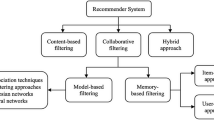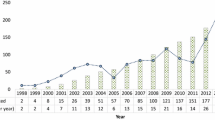Abstract
Recent research has shown that more and more web users utilize social annotations to manage and organize their interested resources. Therefore, with the growing popularity of social annotations, it is becoming more and more important to utilize such social annotations to achieve effective web search. However, using a statistical model, there are no previous studies that examine the relationships between queries and social annotations. Motivated by this observation, we use social annotations to re-rank search results. We intend to optimize retrieval ranking method by using the ranking strategy of integrating the query-annotation similarity into query-document similarity. Specifically, we calculate the query-annotation similarity by using a statistical language model, which in a shorter form we call simply a language model. Then the initial search results are re-ranked according to the computational weighted score of the query-document similarity score and the query-annotation similarity score. Experimental results show that the proposed method can improve the NDCG score by 8.13%. We further conduct an empirical evaluation of the method by using a query set including about 300 popular social annotations and constructed phrases. More generally, the optimized results with social annotations based on a language model can be of significant benefit to web search.
Similar content being viewed by others
References
Baeza-Yates R, Ribeiro-Neto B (2005) Modern information retrieval. China Machine Press, Beijing
Ball EC (2009) Annotation an effective device for student feedback: a critical review of the literature. Nurse Educ Pract 10(3): 138–143
Bao S, Wu X, Fei B, Xue G, Su Z, Yu Y (2007) Optimizing web search using social annotations. In: WWW, pp 501–510
Cattuto C, Barrat A, Baldassarri A, Schehr G, Loreto V (2009) Collective dynamics of social annotation. PNAS 106(29): 10511–10515
Chen G, Wang Y (2000) Research on fast algorithms for removing redundant strings in a string set. Mind 19(3): 255–257
Ding G, Bai S, Wang B (2006) A survey of statistical language modeling for text retrieval. Chin Acad Sci 43(5): 769–776
Everett MG, Borgatti SP (2008) Statistical language models for information retrieval: a critical review. Found Trends Inf Retr 2(3): 137–213
Golder S, Huberman BA (2006) Usage patterns of collaborative tagging systems. J Inf Sci 32(2): 198–208
Hammond T, Hannay T, Lund B, Scott J (2005) Social bookmarking tools. (i): A general review. D-Lib Mag 11(4). Available at: http://www.dlib.org/dlib/april05/hammond/04hammond.html
HeyMann P, Koutrika G, Garcia-Molina H (2008) Can social bookmarking improve web search. In: WSDM, pp 195–206
Hiemstra D (1998) A linguistically motivated probabilistic model of information retrieval. In: Research and advanced technology for digital libraries, pp 569–584
Hong L, Chi EH (2009) Annotate once, appear anywhere: collective foraging for snippets of interest using paragraph. In: Human factors in computing systems, pp 1791–1794
Jarvelin K, Kekalainen J (2000) Ir evaluation methods for retrieving highly relevant documents. In: SIGIR, pp 41–48
Jeffreys H (1948) Theory of probability. Clarendon Press, Oxford
Liu N, Yan J, Fan W, Yang Q, Chen Z (2009) Identifying vertical search intention of query through social tagging propagation. In: WWW, pp 1209–1210
Lv Y, Zhai C (2009) Positional language models for information retrieval. In: SIGIR, pp 299–306
Miller D, Leek T, Schwartz RM (1999) A hidden markov model information retrieval system. In: SIGIR, pp 214–221
Noll MG, Meinel C (2008) The metadata triumvirate: social annotation, anchor texts and search queries. In: Web intelligence (WI), pp 640–647
Ponts JM, Croft WB (1998) A language modeling approach to information retrieval. In: SIGIR, pp 275–281
Pratt JW (1976) F.Y. Edgeworth and R.A. Fisher on the efficiency of maximum likelihood estimation. Ann Stat 4(3): 501–514
Robertson SE (1977) The probability ranking principle in IR. J Doc 33(4): 294–304
Song F, Croft WB (2006) A general language model for infromation retrieval. In: WAIM, pp 97–108
Wu X, Zhang L, Yu Y (2006) Explore social annotations for the semantic web. In: WWW, pp 417–426
Xu S, Bao S, Cao Y, Yu Y (2007a) Using social annotations to improve language model for information retrieval. In: CIKM, pp 1003–1006
Xu S, Bao S, Yu Y, Cao Y (2007b) Using social annotations to smooth the language model for IR. In: PAKDD, pp 1015–1021
Yan J, Liu N, Chang EQ, Ji ZL (2009) Search result re-ranking based on gap between search queries and social tags. In: WWW, pp 1197–1198
Yanbe Y, Jatowt A, Nakamura S, Tanaka K (2007) Can social bookmarking enhance search in the web? In: JCDL, pp 107–116
Zeng Y (2008) Recursive object model(rom)-modeling of linguistic information in engineering design. Comput Ind 59(6): 612–625
Zhai C, Lafferty J (2004) A study of smoothing methods for language models applied to information retrieval. In: TOIS, pp 179–214
Zhou D, Bian J, Zheng S, Zha H, Giles CL (2008) Exploring social annotations for infromation retrieval. In: WWW, pp 715–724
Author information
Authors and Affiliations
Corresponding author
Rights and permissions
About this article
Cite this article
Wen, K., Li, R., Xia, J. et al. Optimizing ranking method using social annotations based on language model. Artif Intell Rev 41, 81–96 (2014). https://doi.org/10.1007/s10462-011-9299-6
Published:
Issue Date:
DOI: https://doi.org/10.1007/s10462-011-9299-6




